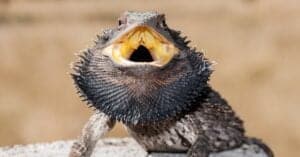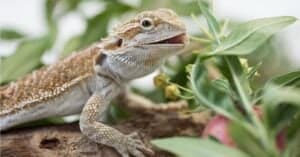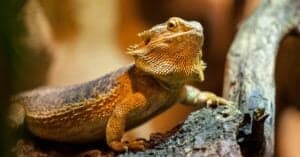Did your bearded dragon go on a hunger strike? It can be frightening when our beloved pets stop eating, even more so when they are small and need to eat more.
Among the most popular pet lizards, bearded dragons are sometimes picky eaters. They’re generally easygoing and don’t have extensive habitat needs like monitor lizards. Plus, their engaging personalities make them fun to be around.
Like most reptiles, a bearded dragon can go for a little while without food. However, knowing why your beardie isn’t eating is often more important than having your pet skip a meal or two.
Let’s dig into the problem – and determine when your veterinarian needs to get involved.
Reasons Why Your Bearded Dragon Stopped Eating
While there are a few frightening reasons a bearded dragon may go on a hunger strike, the most common reasons are easily fixed. Mostly. Yet, if you are worried about your beardie and feel that something is “not quite right,” call your veterinarian.
Food Preferences and Hunger Strikes
Notoriously finicky eaters, bearded dragons sometimes refuse to eat anything but their favorite items. Some have been known to refuse to eat for weeks. If you cave into their dark desires, these adorable, yet stubborn, lizards will know that they’ve got you – and will probably do it again.
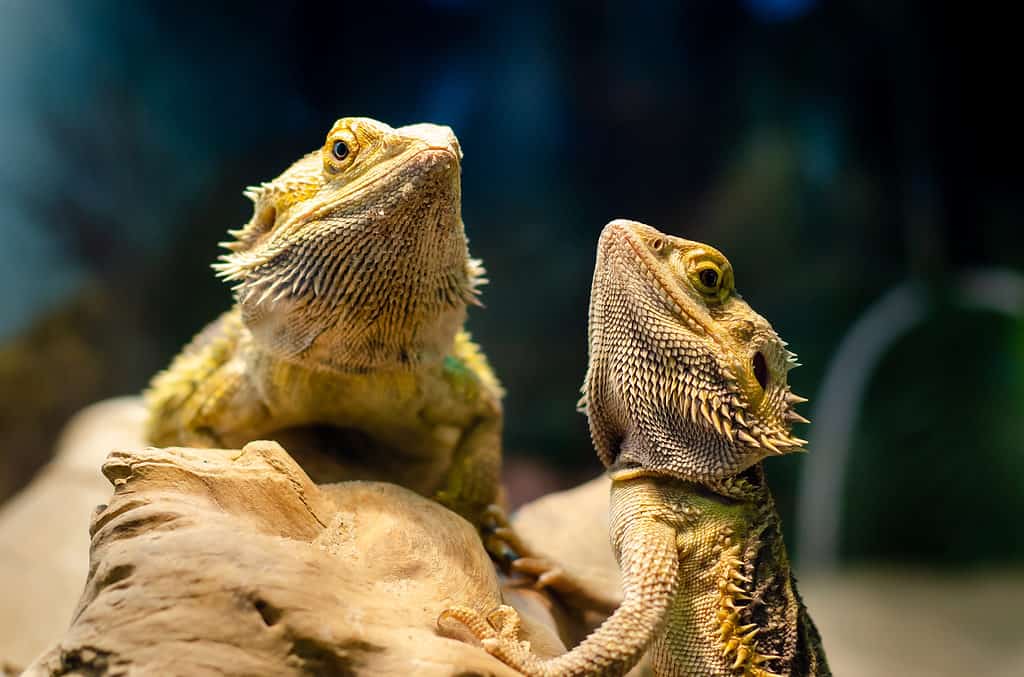
Bearded dragons should only be in the same habitat during breeding season.
©Lutsenko_Oleksandr/Shutterstock.com
Habitat Temperature is Off
What’s a lizard to do? Reptiles must have habitat temperatures correct, or their bodies cannot digest food. If your bearded dragon stopped eating, temperature is the first thing you check. Make sure they have a nice gradient that allows basking and cooling off.
Brumation
This is less likely to happen in captivity because keepers usually maintain consistent temperatures. However, if your beardie’s habitat temperatures fluctuate and dip into the cooler ranges for a few days or weeks, your lizard may be considering taking a winter nap.
On its own, this isn’t a bad thing, especially if you were planning to let the little guy brumate. However, if it was unplanned, check your equipment. And, if you don’t already have a thermostat, it’s time to invest in one. Keeping temperatures in healthy ranges will help your beardie live longer.
Ate Something Toxic
Although bearded dragons can eat many foods, there are things they should avoid. Aside from the obvious – household cleaning products and many houseplants – there are a few less obvious items that are either toxic or can carry toxins and parasites.
- Rhubarb
- Avocados
- Fireflies (and other insects that light up)
- Random insects you find in the yard
If your dragon had access to any of these items and became sick or lethargic afterward, call your vet.
Recent Habitat Changes
Did you remove your bearded dragon’s favorite hide? Or replace the broken basking rock? These lizards dislike change and a bearded dragon may stop eating. But, give it a day or two and it should be fine, just be sure to continue offering food.
Illness
Reptiles get into trouble health-wise quickly, and they don’t show as many symptoms as a dog might. A beardie that fasts for a day or two is probably fine and a short fast can help clear the system of whatever made it stop eating. But, if your lizard is acting weird in addition to not eating, call your veterinarian.
Injury
Although most experts do not recommend keeping multiple bearded dragons in one enclosure, there are times when co-habbing them is necessary. Like breeding time. After all, it takes two to tango. But sometimes the male gets overly assertive, or the female is not interested, and a fight ensues.
Other times, they’re just clumsy.
In any case, if your beardie is injured, it may not want to eat. A call to the vet may be wise, just to rule out anything serious.
Parasites
External parasites like mites are easy to spot, even if they aren’t easy to clear out of the enclosure. But internal parasites are trickier, and some can come from those crickets you found outside. Parasitic infections can easily make a bearded dragon stop eating.
It’s best to have an annual checkup for your beardie to make sure they’re in tip-top health.
Dehydration
These desert-dwelling lizards may not understand that their water bowl is for drinking – but that doesn’t matter. Their water bowl needs to be big enough for them to take a soak. Wide, shallow bowls work best for beardies, so keep their bowls full of clean water.
Metabolic Bone Disease
This disease should scare you-know-what out of you. Metabolic Bone Disease (MBD) occurs when a bearded dragon does not receive a balanced diet with enough calcium and vitamin D3. The bones soften and do not grow properly, causing painful joints and everything else. Left long enough, MBD is fatal.
Luckily, it’s also easy to prevent by providing a balanced diet along with a vitamin and mineral supplement.
Providing a Balanced Bearded Dragon Diet
These lizards are omnivores, and their diet changes as they mature. Young bearded dragons need more protein and eat more, while mature beardies need less protein and overall food.
As a beardie matures, they develop more body mass and some fat stores. Just like humans, adult beardies can put on extra weight if you’re not watching them. Plus, it’s hard to look at a bearded dragon and know whether they’ve put on or lost a few grams. So, a regular weigh-in will be your best bet.
When they transition from a mostly insect diet to a mostly plant-based diet, some will struggle. They like crunchy insects and don’t always want to change, refusing to eat their greens. Be patient, and they’ll adjust.
| Age | Insects | Plant Matter | Frequency |
|---|---|---|---|
| 0 – 6 Months | 80% | 20% | 4-5x daily |
| 6 – 12 Months | 50% | 50% | 2-3x daily |
| 12 – 18 Months | 50% | 50% | 2x daily |
| Adults 18+ Months | 20% | 80% | Plants: 1-2x daily Insects: every other day |
How Long Can a Bearded Dragon Go Without Eating?
Some questions are easy to answer, while others aren’t. Bearded dragons are active animals that move around a lot. They can’t go without food as long as other reptiles. The time a beardie can go without food depends on its age and overall health — a chubby dragon can probably last longer than a skinny one. Generally speaking, an adult can go without food for two to three months – assuming it’s otherwise healthy. Juveniles, on the other hand, shouldn’t go for more than a few days before you call their vet.
In general, as long as your bearded dragon is maintaining weight, and acting normally otherwise, there probably isn’t a cause for concern and they will begin eating again. However, if you notice that in addition to a hunger strike, your beardie exhibits any additional symptoms then it is time to set up an appointment with a veterinarian who has exotic animal experience.
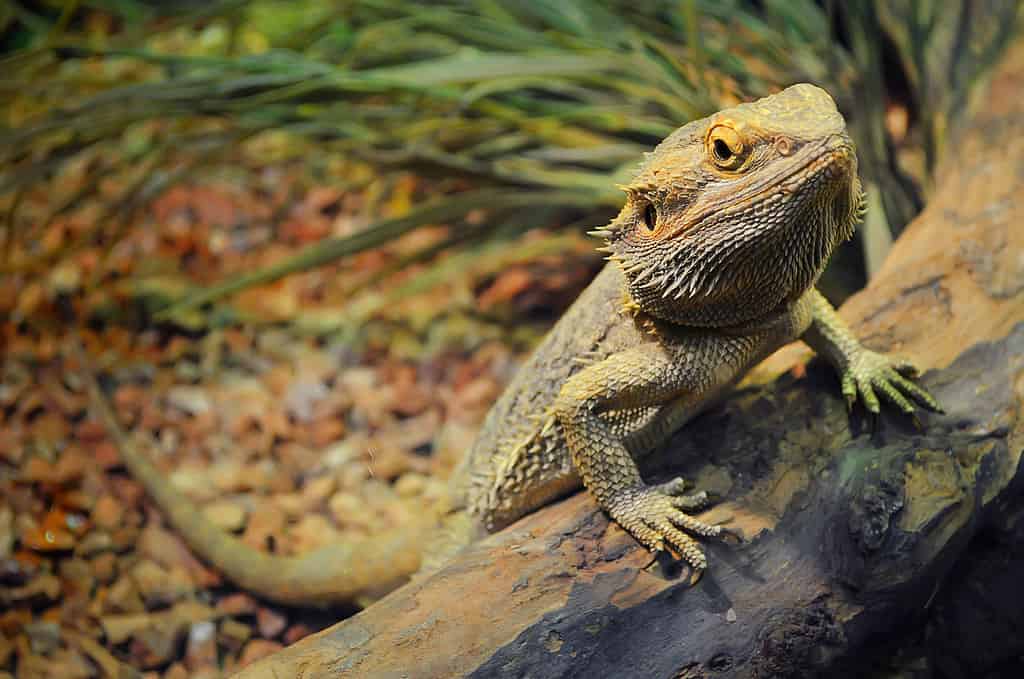
As long as your dragon is behaving normally, a hunger strike should end sooner rather than later.
©Shinedawn/iStock / Getty Images Plus via Getty Images
When Not Eating Is Dangerous for a Bearded Dragon
There are a few signs that it’s time to call your bearded dragon’s veterinarian. A bearded dragon that stops eating is a relatively common occurrence. These lizards, although fun, social, and easygoing, can get ill or have problems just like other pets, which is why having a great vet you can call with questions is so important.
Some symptoms alone are nothing to worry about. But when combined with other symptoms, may add up to a problem. Here’s our list:
- A juvenile bearded dragon stopped eating for more than a day or two.
- If your bearded dragon is lethargic for an unusually long period.
- Eyes are swollen or infected.
- Eyes kept closed for long stretches of time.
- Color changes that aren’t the result of a recent or upcoming shed.
- Weight loss without an explanation (and sometimes even with an explanation)
- Weird discharge from the nose, eyes, or skin can indicate infection
- Pancaking on the enclosure floor with legs sticking straight out
The photo featured at the top of this post is © iStock.com/Ken Griffiths
Thank you for reading! Have some feedback for us? Contact the AZ Animals editorial team.




